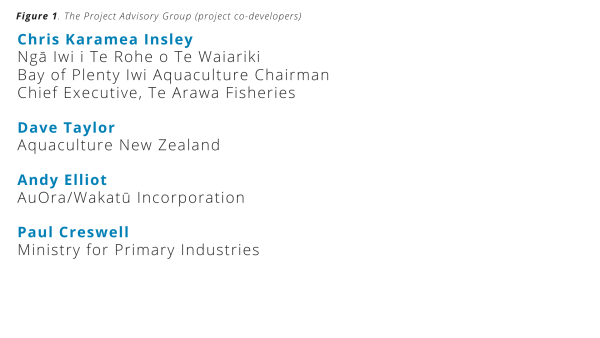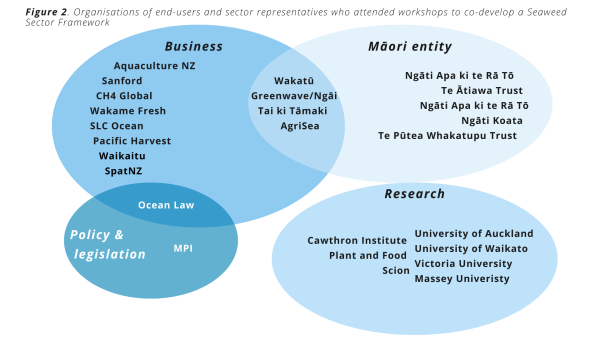- Summary
Strategically launching a rimurimu/seaweed sector
This impact case study demonstrates the role Sustainable Seas research has played in understanding the current sector in Aotearoa New Zealand, and identifying what could help it grow (August 2022)
Aotearoa has a fledgling seaweed sector operating at small scale. Developing it (from wild-harvest and aquaculture through to processing and product development) is of significant interest to Government, industry, Māori, and communities. If approached using ecosystem-based management (EBM), it could help transition Aotearoa to a blue economy.
Strategic development increases the likelihood of an inclusive, equitable, thriving sector that maximises environmental, cultural and social benefits (eg ecosystem services) and generates economic opportunities (eg innovative products, restorative economies).
Our Building a seaweed sector project is working with iwi, stakeholders, industry, researchers, and government agencies that operate (or plan to) in the sector to co-develop a strategic Seaweed Sector Framework grounded in EBM principles. To move forward efficiently, the sector needs to know where we’re starting from and what action is required. The research team conducted a comprehensive review of the domestic and international contexts and critical factors, with clear recommendations to overcome barriers and realise opportunities.
It’s not just what you say…
End-user awareness, buy-in and uptake of the findings is high, due to the team’s strong focus on ensuring outputs are fit-for-purpose through:
- Engagement with co-developers (Figure 1), end-users and sector representatives (Figure 2).
- Making the review findings and recommendations easy to understand and disseminate – the three reports (Markets & regulation, Species characteristics & Te Tiriti o Waitangi considerations, and Environmental effects of seaweed wild-harvest and aquaculture) are clear, concise, do not require technical expertise, and are accompanied by infographics.
The impact of our research:
The project provided a non-partisan space and purposefully involved iwi interested in seaweed, resulting in a diversity of contributors, thought and kōrero. The outcome is a balanced, holistic view of what a thriving sustainable sector could look like, and a pathway to getting there.
The review provided recommendations regarding regulation, research, leadership, Te Tiriti, environment, business models/investment, workforce, and brand/IP. These were positively received by the sector.
- Government
- Accelerate the Aquaculture Strategy: Investment roadmap (p11) – Includes this mahi as an ‘opportunity spotlight’.
- Seaweed farming pilot, Hauraki Gulf, funded by MPI ($2m) and Auckland Council ($1.2m) and in partnership with industry – informed by our review, particularly regarding barriers to commercialisation.
- Māori
- Māori businesses and iwi entities were active in providing input and feedback on the sector review indicating industry interest and buy-in; Andy Elliot (Wakatū) was so engaged the team recognised him as a co-author on part 1.
- 2 Māori businesses and 6 iwi entities contributed to the draft framework (Figure 2).
- The research was discussed at the Smart Māori Aquaculture hui in June 2022.
- Business
- Recommendation from the sector review for establishing a sector ‘voice’
- Welcomed by the Southland Aquaculture Group (unconnected to the research).
- Been met with the launch of the Aotearoa New Zealand Seaweed Association (ANZSA) in April 2022, enabling industry and government agencies to have strategic dialogue towards regulatory change.
- ANZSA’s website contains multiple citations and links to the review’s reports and infographics, and Board Member Hayley Fraser-Mackenzie (MD of Pacific Harvest) commented:
“The revie - w was a crucial first step to map our complex environment, and help us see a way through the challenges. It gives context, outlines priorities, and explains opportunities and challenges. Seaweed has fallen through the cracks previously; without this work we would not have had a starting point.”
- Internationally
- Seaweed round the clock global event – Project was extensively discussed.
- Public – The clear recommendations, industry buy-in (further evidenced by supportive quotes in our media release), and infographics have raised public awareness of the contribution that seaweed could make to our communities and transition to a blue economy via:
- Significant media coverage: Morning Report, TVNZ Breakfast, RNZ Rural News, RNZ online news, The Detail, Te Ao, NZ Herald, Stuff (1), Stuff (2), Newsroom, Waatea News, Newshub, The Listener, AM show, SunLive, TheFishSite, Farmers Weekly, and Marine Farmers Association (p p25–26).
- Community projects sharing/using the infographics: Waiheke Marine Project; Love Rimurimu Facebook, LoveRimurimu website.
- Sustainable Seas social media: posts about the sector review received the top engagement for 2021/22 on Twitter, LinkedIn, Facebook and Instagram.
- Seaweed: An ocean of opportunity! – More than 2,000 primary schoolchildren took part in this ‘virtual fieldtrip’, with 22,000 pageviews of the web resources and 1,400 video views.
Gathering momentum
The sector framework – a strategic roadmap for the sector – is being co-developed and tested on business case studies, with expected publication in December 2022.
Contact
Rob Major [email protected]
Project organisations
Cawthron, EnviroStrat, University of Waikato, Wakatū

